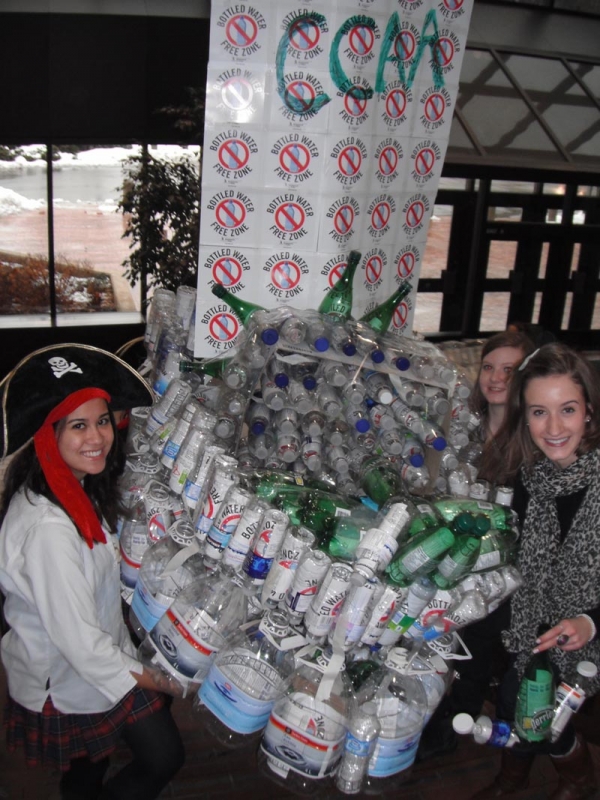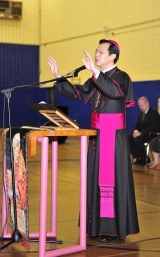Youth Speak News
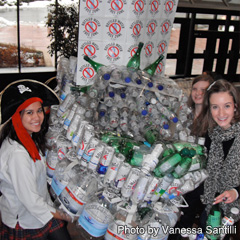 TORONTO - A motion to make the Toronto Catholic District School Board a “bottled water-free zone” by September 2012 has passed unanimously.
TORONTO - A motion to make the Toronto Catholic District School Board a “bottled water-free zone” by September 2012 has passed unanimously.The board will “work towards phasing out and eliminating bottled water in all schools, cafeterias, vending machines, school and board functions and all school board property,” read the motion presented at the April 20 board meeting.
The objective is to have all schools in the TCDSB become bottled water-free zones, said trustee Maria Rizzo, who said she put the motion forward on behalf of all the board’s students. Full implementation will depend on contracts the board has signed with vending machine operators.
“But we might have contracts right now with vending machine companies so we can’t end those until the contract ends,” she said. “I don’t know how long our vending machine contracts go for. They might go until September 2013 but what that means is those contracts will not be renewed.”
Students celebrate Blessed John Paul II
By Michelle D'Souza, Youth Speak NewsTORONTO - Students at John Paul II Catholic Secondary School joined millions around the world to celebrate the beatification of their school’s namesake.
The school community gathered May 2, the day after the beatification ceremony at the Vatican, to hear about the life and contributions of Blessed John Paul II to the world.
Toronto Auxiliary Bishop Vincent Nguyen was one of the guests who spoke to students and staff. Nguyen shared stories of his life, the struggles he faced in Vietnam and how he escaped as one of his homeland’s "boat people" in the 1970s to lead a better life in Canada.
Along with discussing the beatification, Nguyen drew parallels in his life and that of Blessed John Paul II.
Let your beliefs guide your vote at the polls
By Annette Gagliano, Youth Speak News On May 2, Canadians will head to the polls to vote in Canada’s 41st general election. This will be my first time voting in a federal election and I plan on making the most out of this experience.
On May 2, Canadians will head to the polls to vote in Canada’s 41st general election. This will be my first time voting in a federal election and I plan on making the most out of this experience. I will be actively involved in the election process as a poll clerk in my riding — assisting in the polling and in the tallying of the votes. And I will definitely be filling out a ballot. But, for a growing number of young Canadians, exercising their duty to vote is no longer a priority.
As Catholic youth in a society where secularism tends to dominate, it is of utmost importance that we participate in elections and ensure we cast our ballots.
Data from the College Student Alliance’s web site “It’s Your Vote,” a site created to encourage students to vote, says that since the 1960s young voter turnout has been declining — and at a significant rate. In the last federal election in 2008, only 37.4 per cent of 18- to 24-year-olds voted. Moreover, since a significant number of young people do not bother to vote, politicians may be inclined to not include issues that are pertinent to youth because of that demographic’s apathy when it comes to voting.
The election issues that matter to the YSN team
By Vanessa Santilli-Raimondo, The Catholic Register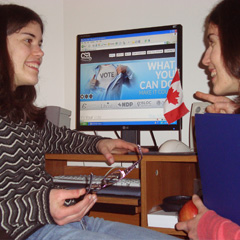 While overall voter turnout among youth may be low, that won’t be the case with The Register’s Youth Speak News team. Those who are eligible to vote plan on hitting the polls on May 2 — and with a wide array of issues guiding their votes.
While overall voter turnout among youth may be low, that won’t be the case with The Register’s Youth Speak News team. Those who are eligible to vote plan on hitting the polls on May 2 — and with a wide array of issues guiding their votes.When Sarah Gagliano goes to the polls on election day, her choice will be guided by her faith.
“I try to see all of the issues through a faith lens,” said Gagliano, a third-year life sciences student at the University of Toronto. “Faith should be lived out and help form our outlook on the world. Being critical of the platforms involves testing these proposals against ideas in the faith.”
Preferential option for the poor, the common good, justice, dignity and peace are some aspects of Catholic social teaching that she keeps in mind when looking at the issues that matter to her: education, health care, the environment and the economy.
For Greg Van Dyk, a second-year humanities student at the University of Victoria, job creation and a strong economy matter most to him, as he’ll be entering the work force in a few years.
Party promises to youth from across the spectrum
By Catholic Register Staff With so many promises being made in the lead-up to the May 2 election, it can be easy to lose track of the issues that matter.
With so many promises being made in the lead-up to the May 2 election, it can be easy to lose track of the issues that matter. Here are the promises the Liberals, Conservatives and NDP are making to young people, straight from their party platforms.
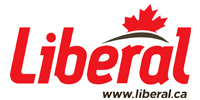
Employment
- To encourage youth getting hired, a Youth Hiring Incentive will give small and medium-sized businesses a full rebate on Employment Insurance premiums for every Canadian youth — between the ages of 18 and 25 — hired.
Education
- Addressing the costs of post-secondary education, the Canadian Learning Passport will provide $1,000 a year (or $1,500 a year for low-income families) over four years for every high school student to use towards college or university.
Health Promotion in Schools
- Through the proposed Canadian Health Promotion Strategy, the Liberals will work with the Council of Ministers of Education to set targets for physical activity in schools and encourage education and promotion of healthy foods in primary and elementary schools.
Service
- Initiate a Canadian Services Corps to financially support Canadian youth wishing to do volunteer service abroad.
- The Canada Service Corps will forgive $1,500 in student loan debt for young Canadians who donate at least 150 hours of service in a year, in a Canada Service Corps volunteer position, after graduating from post-secondary education.
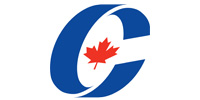
Employment
- Extend support for the Canada Youth Business Foundation, which provides loans and mentoring to young entrepreneurs.
Education
- Enhance the Canada Student Loans Program for part-time students to respond to increased demand for assistance in career transition through post-secondary education.
- Double the work exemption for Canada Student Loans to allow students to benefit more from part-time employment.
- 30 industrial research chairs will be established at colleges and polytechnics so students can interact with innovative researchers.
Youth Crime
- Propose to make permanent its Youth Gang Prevention Fund to help at-risk youth avoid criminal activity.
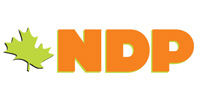
Education
- The NDP proposes to increase the funding to the Canada Student Grants Program by $200 million a year, targeting accessibility for aboriginals, disabled and low-income students.
- Make post-secondary education more affordable by directly attacking rising tuition costs with an $800-million transfer to the provinces and territories to lower tuition fees, as per the NDP’s Post-Secondary Education Act.
- Raise the education tax credit from $4,800 per year to $5,760 to help with increasing education costs.
Employment
- Re-introduce the federal minimum wage law to set a national standard of earning for those who make the lowest wages in the work force.
To access the party platforms, see www.itsyourvote.ca.
(Compiled by Sarah Gagliano and Vanessa Santilli.)
{iarelatednews articleid="5471"}
Finding God through Easter preparation
By Michelle D'Souza, Youth Speak News Living in a secular society, many people see chocolate eggs and bunnies as the reason to celebrate Easter. But the Easter season is much more than that. As Catholic youth, we have prepared for 40 days and nights, commemorating the passion and death of Jesus as we eagerly await the Resurrection. During this time, I have done my best to prepare.
Living in a secular society, many people see chocolate eggs and bunnies as the reason to celebrate Easter. But the Easter season is much more than that. As Catholic youth, we have prepared for 40 days and nights, commemorating the passion and death of Jesus as we eagerly await the Resurrection. During this time, I have done my best to prepare.Jesus died for all mankind, suffering for all of our sins. To know that Jesus gave up His life so that I can live in happiness is a sobering thought.
Today, many give up a vice during Lent in hopes of becoming one with Christ. As a frequent Facebook user, I found myself wasting too much time on the popular social media network. I always made time to fit Facebook into my life but never had the time for important things, like family and prayer. As a Lenten initiative, I gave up Facebook.
Lenten promises help youth grow as Catholics
By Sarah Gagliano, Youth Speak News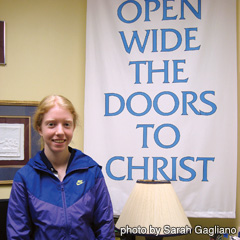
TORONTO - Brad Burt’s Lenten promise was to give up hot showers, which he stuck to for the 40 days. Now, he plans on continuing to sacrifice for the rest of the year.
“I gave up hot showers for Lent as an offering for my relationship with my girlfriend so that we can grow stronger in our faith on our own and as a couple, (and) also as an offering for helping us to discern marriage,” said Burt, a fourth-year mechanical engineering student at the University of British Columbia.
Now that the 40 days of Lent are over, many students have Lenten promise success stories to share, along with some areas for improvement.
Marcio Alves, a fourth-year Portuguese major at the University of Toronto, aimed to give up some of his favourite foods for Lent: soft drinks, pizza, chocolate and popcorn.
Pub dedicated to JPII celebrates beatification
By Sara Angle, Catholic News Service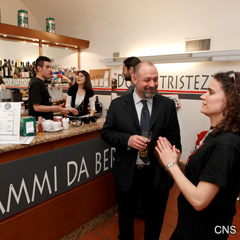 ROME - Young Catholics sip beer and kick back in the crypt beneath the Basilica of St. Charles, home to the GP2 bar and youth club in downtown Rome.
ROME - Young Catholics sip beer and kick back in the crypt beneath the Basilica of St. Charles, home to the GP2 bar and youth club in downtown Rome.The pub, sponsored by the Rome diocesan office of youth ministry and Catholic Action’s youth section, is dedicated to the late Pope John Paul II — Giovanni Paolo II in Italian.
Aside from panini, coffee, beer and wine, the club dished out some special events to celebrate Pope John Paul’s life and beatification, scheduled for May 1.
A special Czech beer, blessed by Plzen Bishop Frantisek Radkovsky, was to arrive at the pub April 20. Blessing beer is rare today, but the bishop will use a prayer written centuries ago when monasteries produced beer and would pray for those who would consume it.
Expressing our love of neighbour in dialogue
By Annette Gagliano, Youth Speak News I was sitting down at a study carrel absorbing lecture material for an upcoming exam when my eyes drifted from my notes to the desk. I noticed some vandalism — there were words written in black ink on the tabletop.
I was sitting down at a study carrel absorbing lecture material for an upcoming exam when my eyes drifted from my notes to the desk. I noticed some vandalism — there were words written in black ink on the tabletop.Expecting to find a meaningless, yet humourous inscription like “U of T is awesome” or “X loves Y,” I was surprised when I pushed my notes aside to expose the entire message. The first word was an underlined heading that said “challenge,” followed by a detailed message that read: “Next time you’re on the bus/subway, talk to the person sitting beside you (if not crazy). It’s amazing what you can get out of a five-minute conversation with someone,” followed by a smiley face. Upon contemplation, I realized that the vandalism had an intrinsic meaning.
In the Bible, we always hear stories of Jesus interacting with people He did not know, tax collectors, lepers, the poor and the blind. Jesus talked to strangers and healed them. Although we cannot heal the blind and crippled in its direct sense, we can make a difference in the lives of those around us.
We are called to be everyday missionaries
By Michelle Walsh, Youth Speak News If you were to ask me two years ago what came to mind when I heard the word missionary, I would have probably said it was a person who dedicated their lives to going overseas and helping the poor while telling them about Jesus. This was not something that I could see myself doing, and I did not think I was a missionary, or could ever be one.
If you were to ask me two years ago what came to mind when I heard the word missionary, I would have probably said it was a person who dedicated their lives to going overseas and helping the poor while telling them about Jesus. This was not something that I could see myself doing, and I did not think I was a missionary, or could ever be one.That is, until the summer of 2009 when I was accepted to participate in Catholic Christian Outreach’s IMPACT mission in Saskatoon. During the mission, my view of a missionary changed as I learned that, through our baptism, we are called to be missionaries in our everyday lives.
“The Church on Earth is by her nature missionary since, according to the plan of the Father, she has as her origin the mission of the Son and the Holy Spirit,” says the Catechism of the Catholic Church. We were encouraged to ask God for a missionary heart, longing for people who do not know Jesus or have fallen away from the Church to enter into a meaningful relationship with Him.
Trust in God while seeking your vocation
By Stephanie Kelly, Youth Speak News If you were given a glimpse into your future, what would you see? It’s impossible to predict, but that doesn’t stop us from trying.
If you were given a glimpse into your future, what would you see? It’s impossible to predict, but that doesn’t stop us from trying.As students, we are faced with uncertainty every day. At a young age, we face pressure to decide our life’s mission. Before we leave high school, we are expected to make decisions that will map out several years of our life and decide our careers.
Every student has moments when they feel their lives are crumbling around them and there is no way out. Those moments usually involve a library, a term paper and more than a few cups of coffee. When those moments arise, we need to remember one thing: we are not alone. Put your trust in God and you will never be led astray.


